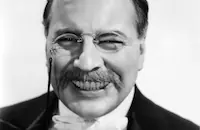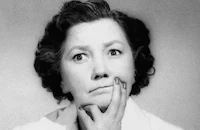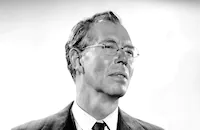Rosemary's Baby

Brief Synopsis
Cast & Crew
Roman Polanski
Mia Farrow
John Cassavetes
Ruth Gordon
Sidney Blackmer
Maurice Evans
Film Details
Technical Specs

Synopsis
Newlyweds Rosemary and Guy Woodhouse move into The Bramford, an old New York apartment building, which, they are told by their friend Hutch, has an infamous history. Shortly thereafter Terry, the ward of their intrusive next door neighbors, the Castevets, leaps to her death. Although Rosemary avoids Roman and Minnie, Guy, an ambitious television actor, enjoys Roman's flattery and spends his evenings with the old couple. When a rival actor is mysteriously blinded, Guy is awarded a choice part in a Broadway show. In celebration of his good fortune, Guy and Rosemary plan to conceive a child. Minnie presents Rosemary with an unappetizing dessert, which she eats out of politeness. Rosemary becomes dizzy, and Guy carries her to bed. Upon awakening, Rosemary remembers having intercourse with a rough beast before an elderly coven, but Guy assures her that the scratches on her body are the result of his drunken lovemaking. Finding herself pregnant, Rosemary consults Dr. Sapirstein, a noted obstetrician recommended by the Castevets. Instead of vitamins, Sapirstein prescribes a tonic concocted by Minnie. Alarmed by Rosemary's subsequent loss of weight and cramps, Hutch investigates Minnie's potion. Alarmed by his findings, Hutch arranges to meet Rosemary, but he falls into a coma and dies. At his funeral Rosemary receives his legacy, a book entitled All of Them Witches , from which she deduces that the name Roman Castevet is an anagram of the celebrated warlock, Steven Marcato. Certain that the Castevets, Guy, and Sapirstein have conspired to murder her unborn child, Rosemary seeks refuge with Dr. Hill, her former gynecologist, who betrays her to the conspirators. In her apartment, Rosemary is delivered of a son. When she asks to see the baby, Guy informs her that the boy was born dead. Having heard an infant crying in the next apartment, Rosemary arms herself with a butcher knife. In the Castevets' living room she discovers the coven and her son Adrian, the antichrist, nestled in a black basinet. Although Rosemary recoils at the sight, she hums him a lullaby.

Director

Roman Polanski
Cast

Mia Farrow

John Cassavetes

Ruth Gordon

Sidney Blackmer

Maurice Evans

Ralph Bellamy
Angela Dorian

Patsy Kelly

Elisha Cook
Emmaline Henry
Marianne Gordon
Philip Leeds
Charles Grodin
Hanna Landy
Hope Summers

Wende Wagner
Gordon Connell
Janet Garland
Joan Reilly

Tony Curtis

William Castle

Walter Baldwin
Charlotte Boerner
Sebastian Brook
Ernest Harada
Natalie Masters
Elmer Modlin
Patricia O'neal
Robert Osterloh
Almira Sessions
Bruno Sidar
Crew
William Castle
William Castle
William C. Davidson
Farciot Edouart
William A. Fraker
Sydney Guilaroff
Dona Holloway
Howard W. Koch Jr.
Krzysztof Komeda
Harold Lewis
Daniel J. Mccauley
Robert Nelson
Sam O'steen
Roman Polanski
Luanna Poole
Vidal Sassoon
Joel Schiller
Allan Snyder
Anthea Sylbert
Richard Sylbert
John Wilkinson
Sherry Wilson
Robert Wyman

Film Details
Technical Specs

Award Wins
Best Supporting Actress
Award Nominations
Best Writing, Screenplay
Articles
Rosemary's Baby
The film rights to the novel were immediately snapped up by producer/director William Castle while the book was still in galley form (literary agent Marvin Birdt smuggled him a copy). Castle, of course, was the ingenious promoter and director behind such schlocky horror movies as House on Haunted Hill (1958) and Homicidal (1961); his ad campaigns, which always focused on an outrageous gimmick (like electrically-wired seats for The Tingler, 1959), were often more effective than his pictures. But Rosemary's Baby was going to be Castle's bid for respectability; he was going to direct an adult horror film on a big budget for a change. There was a catch. He spent all his money on the film rights and had to take on a partner, Paramount, who agreed to finance it plus award him fifty per cent of the profits. However, they were set on Roman Polanski directing it. Despite his huge disappointment, Castle eventually agreed to serve as producer.
Polanski was particularly impressed with Levin's novel and excited about telling the story in cinematic terms but, according to his autobiography, Roman, "one aspect of Rosemary's Baby bothered me. The book was an outstandingly well-constructed thriller...Being an agnostic, however, I no more believed in Satan as evil incarnate than I believed in a personal god; the whole idea conflicted with my rational view of the world. For credibility's sake, I decided that there would have to be a loophole: the possibility that Rosemary's supernatural experiences were figments of her imagination. The entire story, as seen through her eyes, could have been a chain of only superficially sinister coincidences, a product of her feverish fancies...That is why a thread of deliberate ambiguity runs throughout the film."
Casting for Rosemary's Baby presented its own problems. Polanski wanted Tuesday Weld for the lead, Castle wanted Mia Farrow. Both men wanted Robert Redford for the role of Guy Woodhouse, Rosemary's husband, but negotiations broke down when Paramount's lawyers served the actor a subpoena over a contractual dispute involving Silvio Narizzano's film Blue (1968). Richard Chamberlain, Robert Wagner and James Fox were all mentioned for the part of Guy. Laurence Harvey begged to do it, Jack Nicholson actually tested for it, and Polanski tried to convince Warren Beatty to do it before the part was given to John Cassavetes. For Minnie and Roman Castevet, Polanski suggested Alfred Lunt and Lynn Fontanne, the famous Broadway acting duo. He even tried to convince Castle to play the part of Dr. Sapirstein, a role eventually filled by Ralph Bellamy. In the end, everything fell into place as if by fate and it's hard to imagine a more perfect cast for Rosemary's Baby, particularly Mia Farrow, whose harrowing performance was a surprise to most critics.
In her autobiography, What Falls Away, Mia Farrow described her working relationship with Roman Polanski on the set of Rosemary's Baby: "When Roman wanted me to eat raw liver, I ate it, take after take, even though, at the time, I was a committed vegetarian. While we were shooting on Park Avenue, he had the idea that I should absentmindedly walk across the street into moving traffic, not looking right or left. 'Nobody will hit a pregnant woman,' he laughed, referring to my padded stomach. He had to operate the hand-held camera himself, since nobody else would. I took a deep breath - an almost giddy, euphoric feeling came over me. Together Roman and I marched right in front of the oncoming cars - with Roman on the far side, so I would have been hit first. 'There are 127 varieties of nuts,' he told a journalist. 'Mia's 116 of them.' I'll take a compliment any way it comes." Off screen, Farrow was having marital difficulties with Frank Sinatra and they divorced in August of 1968 while Mia was in the midst of filming Secret Ceremony.
Despite the fact that Rosemary's Baby was easily the most successful film of William Castle's career, he felt the film carried a curse for him. Not only was he denied directing it but he found working with Polanski a very frustrating experience. The worst part was being struck down with a severe case of gallstones immediately following the production. Castle was subjected to months of painful treatments and eventually surgery. During his slow rehabilitation, he learned that Krzysztof Komeda, the film's composer, had died suddenly in an accidental fall and just after his recovery he received the news that Polanski's wife, Sharon Tate, and four others had been slain in a ritualistic mass murder at their Benedict Canyon home. As he stated in his biography, Step Right Up! I'm Gonna Scare the Pants Off America, "The story of Rosemary's Baby was happening in real life. Witches, all of them, were casting their spell, and I was becoming one of the principal players." But in the actual film, he's only a minor player; yes, that's him standing outside the phone booth while Mia Farrow is frantically trying to make a call. Other interesting cameos include childhood star and comedienne Patsy Kelly as a devilish nurse and Playboy pinup Victoria Vetri (billed here as Angela Dorian) whose other claim to fame is her starring role in When Dinosaurs Ruled the Earth (1970). That's her in a brief scene in the creepy basement of the Dakota with Mia Farrow, discussing her mysterious locket.
Director: Roman Polanski
Producer: William Castle
Screenplay: Roman Polanski (based on the novel by Ira Levin)
Cinematography: William Fraker
Production Design: Richard Sylbert
Music: Krzysztof Komeda
Cast: Mia Farrow (Rosemary Woodhouse), John Cassavetes (Guy Woodhouse), Ruth Gordon (Minnie Castevet), Sidney Blackmer (Roman Castevet), Maurice Evans (Edward Hutchins), Ralph Bellamy (Dr. Sapirstein), Charles Grodin (Dr. Hill).
C-137m. Letterboxed.
by Jeff Stafford

Rosemary's Baby
Quotes
Why, congratulations, papa!- Elise Dunstan
Thanks! There was nothing to it.- Guy Woodhouse
Pregnant women are supposed to gain, not lose weight!- Edward 'Hutch' Hutchins
What the hell is that?- Guy Woodhouse
I've been to Vidal Sassoon.- Rosemary Woodhouse
You mean you actually paid for it?- Guy Woodhouse
He chose you, honey! From all the women in the world to be the mother of his only living son!- Minnie Castevet
To 1966! The year one!- Roman Castevet
Trivia
The Dakota Building on Manhattan's Upper West Side was renamed The Bramford for the film.
It was on the set of this film that Mia Farrow received divorce papers from then-husband Frank Sinatra.
'Hitchcock, Alfred' was originally offered the chance to direct this movie.
There is a popular rumor that Church of Satan founder Anton LaVey gave technical advice and portrayed Satan in the impregnation scene. This is false - LaVey had no involvement with the film.
Oscar-nominated editor Sam O'Steen would later direct the sequel, Look What's Happened to Rosemary's Baby (1976) (TV).
Notes
Location scenes filmed in New York City and at Playa del Rey, California.

Miscellaneous Notes
Voted One of Ten Best Films of the Year by the 1968 New York Times Critics.
Released in United States March 1980
Released in United States Summer June 12, 1968
Re-released in United States October 31, 2008
Released in USA on video.
Polanski made his first American film with this picture.
Re-released in Paris November 13, 1991.
Released in United States March 1980 (Shown at FILMEX: Los Angeles International Film Exposition (John Cassavetes American Filmmaker) March 4-21, 1980.)
Released in United States Summer June 12, 1968
Re-released in United States October 31, 2008 (New York City)














